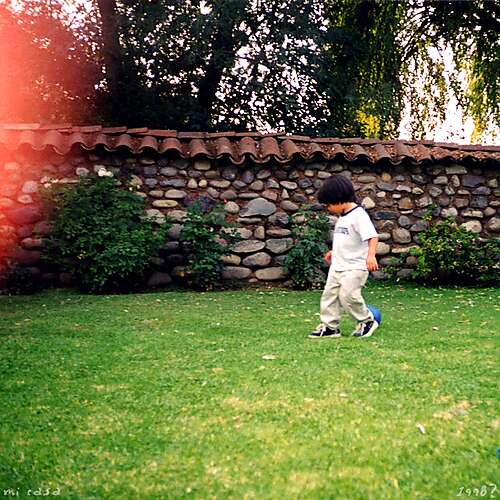Quién es Geronimo
Quién es Geronimo
[ he/him ]
city: Mexico Citycountry: Mexico
genre: Alternative, Indie
styles: Indie Folk, Singer-Songwriter, Acoustic Pop

Mi Casa
 LP
LP
Spotify Soundcloud
Reviews and Comments
Returning home has been a recurring theme in works of art for millennia. But what if home was more than just a destination? What if the comfort and reward of home could be uncovered in realms of transition? In the journey itself? On his debut album Mi Casa, Tomás Mendizabal — aka Quién Es Geronimo — explores these concepts through a remarkably fresh take on confessional songwriting, ambient pop, and stunningly vibrant alt folk. But to understand the concepts behind Mi Casa, you must first understand Quién Es Geronimo.
In the past decade, the singer-songwriter left behind his roots in Chile, completed his music studies in the Netherlands, and had his heart broken in Berlin, all before settling in Mexico City in the early months of 2022. These experiences left Mendizabal transformed, emotionally devastated, and ultimately, inspired enough to create Mi Casa.
“Although I’ve always justified moving to other countries for practical reasons,” the artist explains, “I think the main reason is more spiritual than anything else. I’m in search of experiences. Experiences that linger only in your memory: beautiful and fun nights with friends, people you fell in love with, goodbyes, and the final realization that you are merely the continuity of it all.”
According to Mendizabal, this is the dimension where the concept of home begins to manifest, the idea that “no matter under which circumstances and how far from your loved ones you are, it is within yourself that home needs to be built, upon the loving and cherished memories that have transformed you.”
On Mi Casa, this philosophy is distilled into an album that is by turns oneiric yet lucid, meditative yet dynamic, and above all, unforgettable. The collection was initially conceived as a sort of soundtrack for the liminal space between dreams and waking life, a map for weary travelers who slip from the tumult of reality into gentle realms of sleep.
“Punto Final” greets you with simple strummed guitar and lulling bass before Mendizabal’s voice enters the landscape, laden with overdubs and subtle experimental textures. Emerging like a sprout reaching for light, the song — like most of Mi Casa — the song maintains a darkness at its roots, as the artist questions where the “final point” in life and love may lie. Mendizabal’s gentle voice and lush instrumentation further belies themes like jealousy and anguish on tracks like “Dime si es Verdad” and the stunning two-part composition “Serotonina,” which begins as a sorrowful acoustic ballad before guiding the listener to sublime peaks richly adorned with seraphic strings and slide guitar.
Through a series of dreamlike instrumental interludes, Medizabal suspends the listener in the gauzy world of Mi Casa. In less skilled hands, transitional tracks like these could feel like filler, but on Mi Casa, they weave the album into a cohesive whole, as they complete the chiaroscuro, adding depth and relief.
“Outro,” the final track on the album, finds Mendizabal at the piano, saying farewell to the friends and lovers he’s met along the way. “It is a bit sad,” the songwriter explains, “but I see it as a gratitude song. All of these people have become my family over the years. Ultimately, they’re my home.” Listening to Mi Casa, it's easy to dissolve into the tableau: the journey, the dream, and everything that’s happened along the way.
On the cover of Mi Casa, the artist behind Quién Es Geronimo poses next to a friend wearing a monster mask. Although the photo was taken as a joke, it serves as a fitting representation for the artist’s debut. The sojourn has been beautiful, the landscape gentle and dreamlike, and yet the monster remains. On Mi Casa, Quién Es Geronimo doesn’t work to fight the creeping darkness, he embraces it as one of the integral workings and viscera of home.
latest releases




















